According to Gallup's recent social audit of race relations in the United States*, fewer Americans today than in any of our previous surveys feel that relations between blacks and whites have gotten worse in the past year.
In the latest poll, 31% of the nation's adults say that black-white relations have improved, 57% feel they have remained the same, and only 9% say that relations between blacks and whites have gotten worse. Similar proportions of blacks (31%) and whites (30%) feel that relations have improved, but nearly twice as many blacks (17%) as whites (9%) feel that relations have gotten worse in the past year.
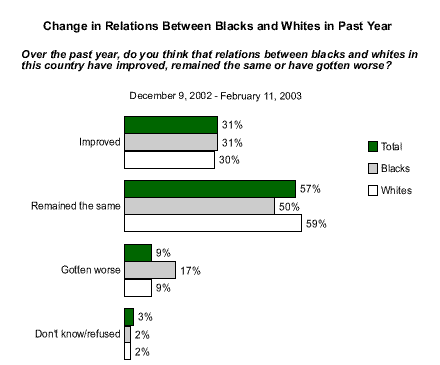
Younger blacks are much more likely than older backs to feel that relations have improved in the past year -- 42% of blacks aged 18 to 34 say so, compared to 28% of those aged 35 to 49, and 22% of blacks aged 50 and older. Among whites, there were no age-based differences in the percentage saying that black-white relations have improved.
In prior surveys, ���۴�ýfound remarkably small gaps between the percentages of blacks and whites saying that relations had improved or gotten worse. In 1997, at the height of the O.J. Simpson murder trial, 32% of blacks and 29% of whites said that race relations had gotten worse. In the latest survey, the proportion of whites saying that relations have gotten worse has dropped to its lowest level since ���۴�ýbegan asking the question six years ago (9%), and the gap between the proportion of blacks and whites holding this opinion stands at eight percentage points.
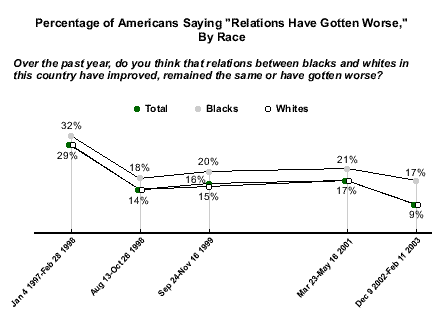
Education Paradox?
Among whites, higher education is associated with greater optimism about the future of black-white relations. Only 35% of white college graduates say that race relations will always be a problem, compared with 50% of whites with less formal education. Among blacks, however, higher education is associated with an increase in pessimism about black-white relations. Among black college graduates, 69% believe race relations will always be a problem in the United States, compared to 57% of blacks who have not graduated from college. The question of whether this gap reflects politicization of race relations in higher education, the real-world difficulties blacks may experience with regard to racial discrimination in educational or career advancement, or other factors associated with higher socioeconomic status, remains unanswered.
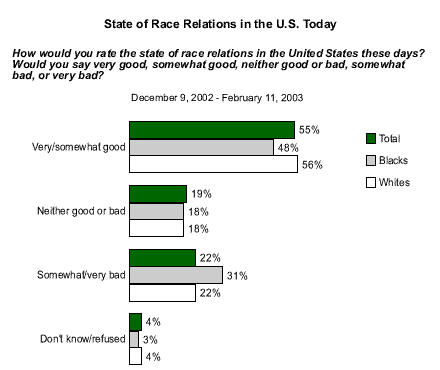
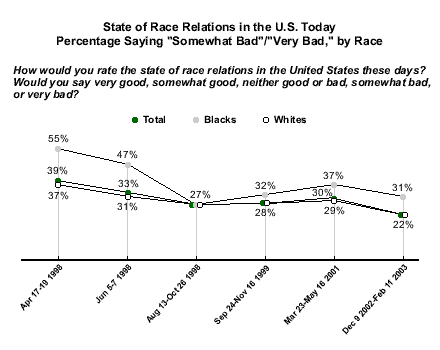
Although a greater percentage of blacks than whites feel that the current state of race relations is somewhat or very bad (31% vs. 22%), this is the lowest proportion of either group saying that race relations are bad since ���۴�ýfirst asked this question in 1998.
When asked to look to the future, U.S. adults are evenly divided between those who say that relations between blacks and whites will always be a problem (47%), and those who believe that a solution will eventually be worked out (50%). Among blacks, however, a majority is pessimistic -- 59% think that relations between blacks and whites will always be a problem, compared with 39% who are optimistic about an eventual solution.
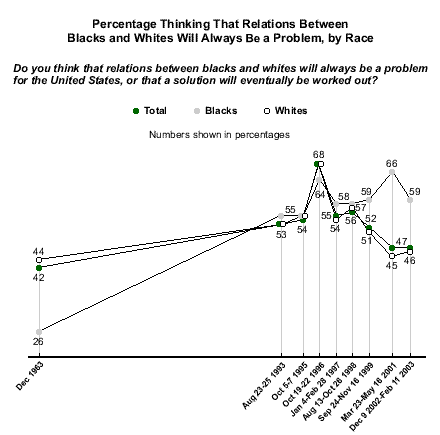
*���۴�ýconducted 1,044 telephone interviews from Dec. 9, 2002, through Feb. 11, 2003, with a randomly selected sample of adults in the continental United States. We interviewed roughly equal numbers of black and white respondents, permitting more reliable estimates of black opinion than would be possible in a standard national sample of a similar size. For our total sample of 1,044, one can say with 95% confidence that the margin of sampling error for percentages is not greater than ±5%. The parallel margins of sampling error are ±6% for the sample of 505 white respondents, and ±6% for the sample of 501 black respondents.
